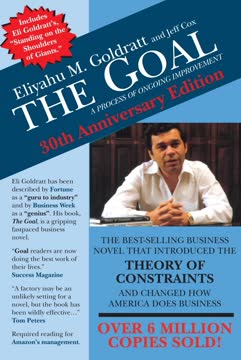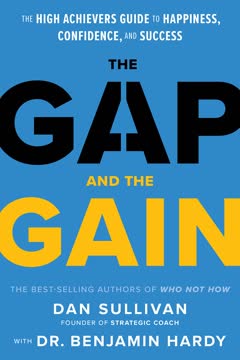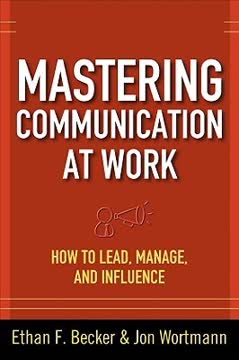Key Takeaways
1. Pursue Excellence Through Continuous Growth and Learning
"The pursuit of excellence is about the fanatical pursuit of gradual improvement."
Excellence is a journey, not a destination. It requires a mindset of continuous improvement and a willingness to embrace challenges. This pursuit involves:
- Constant self-reflection and evaluation
- Seeking feedback and learning from mistakes
- Setting ambitious goals and pushing beyond comfort zones
To sustain excellence, one must adopt a growth mindset, believing that abilities can be developed through dedication and hard work. This approach fosters resilience and a love for learning, essential qualities for long-term success.
2. Embrace the Power of Others in Your Journey
"We are all the sum of our experiences. I want to learn about those experiences from others."
Relationships fuel growth. Surrounding yourself with the right people can significantly accelerate your progress towards excellence. Key strategies include:
- Seeking mentors and role models
- Building a diverse network of peers and advisors
- Practicing active listening and genuine curiosity about others' experiences
By leveraging the power of others, you gain access to diverse perspectives, knowledge, and opportunities that can propel your personal and professional development.
3. Develop a Purpose Mindset and Focus on What Lights You Up
"Don't ask what the world needs, ask what makes you come alive, and go do it. Because what the world needs are people who come alive."
Find your passion and align it with your purpose. This alignment creates intrinsic motivation and sustained energy for pursuing excellence. To develop this mindset:
- Identify activities that energize and fulfill you
- Connect your work to a larger purpose or mission
- Regularly reflect on your values and how they manifest in your actions
When you focus on what lights you up, you're more likely to persevere through challenges and find joy in the pursuit of excellence.
4. Build Confidence Through Preparation and Action
"Preparation is the greatest medicine for fear, and it's a way to show respect for others."
Confidence is earned through consistent preparation and action. It's not about eliminating fear, but about developing the courage to act despite it. Build confidence by:
- Over-preparing for important events or challenges
- Taking small, consistent actions towards your goals
- Celebrating small wins and learning from setbacks
Remember that confidence is a skill that can be developed over time. The more you prepare and take action, the more your confidence will grow.
5. Overcome Resistance and Adapt to Change
"Excellence requires operating the same way as playing an 'infinite game' in which being 'ahead' or 'behind' replaces 'winning' and 'losing,' and the competition is not another person, company, or market—it is only themselves in the past."
Embrace challenges as opportunities for growth. Resistance and change are inevitable parts of any journey towards excellence. To thrive in the face of these challenges:
- Develop a mindset that views obstacles as learning opportunities
- Practice resilience by focusing on what you can control
- Cultivate adaptability by regularly stepping out of your comfort zone
By reframing resistance and change as essential elements of growth, you can maintain momentum in your pursuit of excellence.
6. Cultivate Trust and Generosity in Relationships
"Make trust your opening bid. Jim, it comes down to this. It's upside and downside. I choose to believe there's a much greater upside in trusting people and a much greater downside in not trusting people."
Build strong connections through trust and generosity. These qualities form the foundation of meaningful relationships that support your journey to excellence. Practice:
- Leading with trust in new relationships
- Being generous with your time, knowledge, and resources
- Cultivating empathy and active listening skills
By fostering an environment of trust and generosity, you create a supportive network that can accelerate your growth and amplify your impact.
7. Make Commitment to Personal Development a Lifelong Pursuit
"Excellence is about the lifelong pursuit of improvement. It is the drive for perfection (which can never be attained) that leads to the development of mastery."
Embrace lifelong learning as a core value. The pursuit of excellence is not a finite goal but a continuous journey of growth and self-improvement. To make this commitment:
- Develop a daily learning habit (e.g., reading, reflection, skill practice)
- Seek out diverse learning experiences and challenges
- Regularly reassess and adjust your personal development goals
By committing to lifelong learning and personal development, you ensure that your pursuit of excellence remains dynamic and fulfilling throughout your life.
Last updated:
FAQ
What's The Pursuit of Excellence about?
- Focus on Excellence: The book delves into the behaviors and mindsets of highly productive achievers, distinguishing between success and excellence. It provides a roadmap for readers to pursue their own version of excellence in life and work.
- Practical Insights: Ryan Hawk combines personal anecdotes, interviews with successful leaders, and actionable advice to help readers understand the principles of excellence. The book is structured into three parts: The Build, The Fuel, and The Chase.
- Continuous Improvement: Hawk emphasizes that excellence is a lifelong pursuit, encouraging readers to adopt a growth mindset and focus on gradual improvement over time.
Why should I read The Pursuit of Excellence?
- Inspiration and Motivation: Filled with inspiring stories and examples from high achievers, the book motivates readers to strive for their best and serves as a guide for elevating personal and professional lives.
- Actionable Advice: Readers will find practical strategies and tools to improve performance and mindset immediately. Hawk provides a clear framework for understanding and pursuing excellence.
- Expert Insights: Drawing on interviews with renowned leaders and thinkers, the book offers a wealth of knowledge and experience, making it a valuable resource for leadership and personal development.
What are the key takeaways of The Pursuit of Excellence?
- Success vs. Excellence: Hawk defines success as a comparison with others, while excellence is measured against one’s own potential, encouraging personal growth over external validation.
- Purpose Mindset: Emphasizes the importance of a purpose-driven approach to work and life, suggesting that finding meaning in what you do is crucial for achieving excellence.
- Consistency and Discipline: Highlights the need for consistent effort and discipline in pursuing goals, using the analogy of a stonecutter to illustrate that persistence leads to eventual success.
What are the best quotes from The Pursuit of Excellence and what do they mean?
- “Success is based on a comparison with others. Excellence is measured against your own potential.”: Urges readers to focus on personal growth rather than competing with others.
- “To give anything less than your best is to sacrifice the gift.”: Emphasizes the importance of striving for excellence in all endeavors, reminding us to maximize our potential.
- “You must never confuse faith that you will prevail in the end—which you can never afford to lose—with the discipline to confront the most brutal facts of your current reality.”: Highlights the balance between optimism and realism in the pursuit of excellence.
How does Ryan Hawk define excellence in The Pursuit of Excellence?
- Personal Benchmark: Hawk defines excellence as the relentless pursuit of becoming better than your previous self, setting personal standards and striving to meet them consistently.
- Growth Mindset: Emphasizes adopting a growth mindset, where challenges are seen as opportunities for learning and improvement, fostering resilience and adaptability.
- Long-Term Commitment: Portrays excellence as a lifelong journey rather than a one-time achievement, encouraging readers to embrace the process and commit to continuous self-improvement.
What role do relationships play in The Pursuit of Excellence?
- Transformational Relationships: Hawk stresses the importance of surrounding oneself with people who inspire and challenge you, providing support, accountability, and new perspectives.
- Building Trust: Discusses the necessity of building trust within relationships to foster collaboration and growth, foundational for effective teamwork and personal development.
- Learning from Others: Highlights that learning from the experiences and insights of others can accelerate personal growth, with meaningful conversations and mentorship as key strategies.
How can I apply the concepts from The Pursuit of Excellence in my daily life?
- Set Personal Goals: Define what excellence means to you and set specific, measurable goals to work towards, regularly assessing progress and adjusting strategies as needed.
- Practice Self-Awareness: Conduct self-audits and seek feedback from trusted peers to gain insights into strengths and areas for improvement, helping stay aligned with goals.
- Embrace Challenges: Adopt a mindset that views challenges as opportunities for growth, focusing on the process of learning and improving rather than solely on outcomes.
What is the significance of the "Purpose Mindset" in The Pursuit of Excellence?
- Finding Meaning: Emphasizes the importance of finding meaning in your work and life, connecting actions to a greater purpose to stay motivated and committed.
- Long-Term Fulfillment: Argues that a purpose-driven approach leads to greater satisfaction and fulfillment, encouraging pursuit of passions that resonate with values and aspirations.
- Resilience in Adversity: A clear purpose provides strength and resilience during challenging times, serving as a guiding light to navigate obstacles and stay focused on goals.
How does The Pursuit of Excellence address the concept of resistance?
- Understanding Resistance: Discusses resistance as a natural part of the journey toward excellence, manifesting as self-doubt, fear, and external challenges that can hinder progress.
- Strategies to Overcome: Offers strategies for overcoming resistance, such as breaking down goals into manageable steps and maintaining a focus on the process to build momentum and confidence.
- Embracing Discomfort: Encourages readers to embrace discomfort as a necessary part of growth, developing resilience by facing challenges head-on to push through barriers.
What is the Feynman Technique mentioned in The Pursuit of Excellence?
- Learning Through Teaching: Involves teaching a concept to someone else, which helps clarify understanding and identify gaps in knowledge.
- Four Steps: The process includes choosing a topic, teaching it in simple terms, identifying gaps in understanding, and organizing information into a coherent narrative.
- Effective Learning Tool: Encourages active engagement with material, making it easier to retain and apply knowledge.
How does The Pursuit of Excellence define narcissism and its impact on leadership?
- Narcissism Defined: Describes narcissism as a personality trait characterized by a craving for admiration, leading to unstable relationships and a lack of loyalty.
- Balance is Key: Emphasizes maintaining a balance between healthy self-esteem and narcissistic tendencies to foster effective leadership.
- Self-Reflection: Encourages leaders to regularly question motivations and behaviors to ensure narcissism does not undermine effectiveness.
What strategies does The Pursuit of Excellence suggest for building a strong team?
- Create a Healthy Culture: Establishing a positive team culture is crucial for fostering collaboration and trust among team members.
- Hire for Fit: Advises focusing on hiring individuals who align with the team's values and culture, rather than just their skills or experience.
- Develop Trust and Respect: Building strong relationships through open communication and accountability is essential for a high-performing team.
Review Summary
The Pursuit of Excellence by Ryan Hawk receives mostly positive reviews, with an average rating of 4.19 out of 5. Readers appreciate the book's focus on continuous self-improvement, actionable advice, and insights from successful individuals. Some find it inspirational and easy to read, while others note its similarity to other self-help books. The book emphasizes the importance of daily habits, discipline, and a growth mindset. Critics mention the book's reliance on familiar tropes and its brief treatment of concepts, potentially limiting their long-term impact on readers.
Similar Books







Download PDF
Download EPUB
.epub digital book format is ideal for reading ebooks on phones, tablets, and e-readers.






